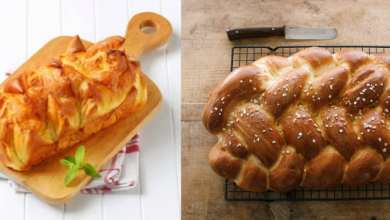The Surprising Truth About Brioche Bread: Why It’s So Sweet!
What To Know
- A small amount of sugar is typically added to the dough to enhance the natural sweetness of the other ingredients.
- The type of flour used, such as bread flour or all-purpose flour, can influence the texture and flavor of the bread.
- The secret to creating the perfect brioche bread lies in achieving a harmonious balance between all the ingredients.
Brioche bread, with its golden-brown crust and tender, fluffy interior, is a culinary delight that tantalizes taste buds with its irresistible sweetness. Unlike ordinary bread, brioche boasts an unparalleled richness that sets it apart. But what is the secret behind its captivating sweetness?
The Magic of Butter
The primary culprit responsible for brioche’s extraordinary sweetness is its generous amount of butter. Butter, a dairy product derived from milk, is composed primarily of fat, which contributes significantly to the bread’s richness and flavor. The high proportion of butter in brioche dough creates a velvety texture and a melt-in-your-mouth sensation.
Eggs: The Sweetening Agent
Eggs play a multifaceted role in brioche bread. Besides adding structure and binding the ingredients together, they also contribute to its sweetness. Eggs contain natural sugars, such as glucose and fructose, which enhance the bread’s overall flavor profile. The higher the egg content, the sweeter the brioche will be.
Sugar: A Simple Indulgence
While butter and eggs are the main contributors to brioche’s sweetness, sugar also plays a subtle role. A small amount of sugar is typically added to the dough to enhance the natural sweetness of the other ingredients. Sugar interacts with the yeast during fermentation, resulting in the production of carbon dioxide gas, which gives brioche its characteristic airy texture.
Yeast: The Sweetness Catalyst
Yeast, a microscopic fungus, is the driving force behind the fermentation process in brioche bread. As yeast consumes the sugars present in the dough, it produces carbon dioxide gas and alcohol. The carbon dioxide gas creates the bread’s airy texture, while the alcohol evaporates during baking, leaving behind a slightly sweet flavor.
Milk: The Softness Enhancer
Milk is another essential ingredient in brioche bread. It adds moisture and softness to the dough, contributing to the overall richness and sweetness. Milk also contains a small amount of natural sugars, which further enhance the bread’s flavor.
Flour: The Foundation of Brioche
While not directly responsible for the sweetness of brioche bread, flour provides the foundation for all the other ingredients to come together. The type of flour used, such as bread flour or all-purpose flour, can influence the texture and flavor of the bread.
The Perfect Balance
The secret to creating the perfect brioche bread lies in achieving a harmonious balance between all the ingredients. The precise proportions of butter, eggs, sugar, yeast, milk, and flour must be carefully calibrated to create a bread that is both sweet and satisfying.
Enjoying Brioche’s Sweet Delights
Brioche bread can be enjoyed in a multitude of ways. Its versatility makes it a perfect accompaniment to both sweet and savory dishes. Spread it with your favorite jam or honey for a delightful breakfast treat. Pair it with a rich stew or soup for a comforting meal. Or simply savor it as a standalone indulgence.
Quick Answers to Your FAQs
1. Why is my brioche bread not sweet enough?
- Ensure you are using the correct proportions of ingredients, especially butter, eggs, and sugar.
- Allow the dough to rise for a sufficient amount of time to allow the yeast to fully ferment the sugars.
- Consider adding a touch more sugar to the dough if desired.
2. Can I use margarine instead of butter in brioche bread?
- While margarine can be used as a substitute for butter, it will not produce the same rich flavor and texture. Butter is the preferred choice for authentic brioche bread.
3. How do I store brioche bread to maintain its sweetness?
- Store brioche bread in an airtight container at room temperature for up to 3 days.
- For longer storage, wrap the bread tightly in plastic wrap and freeze for up to 2 months.

